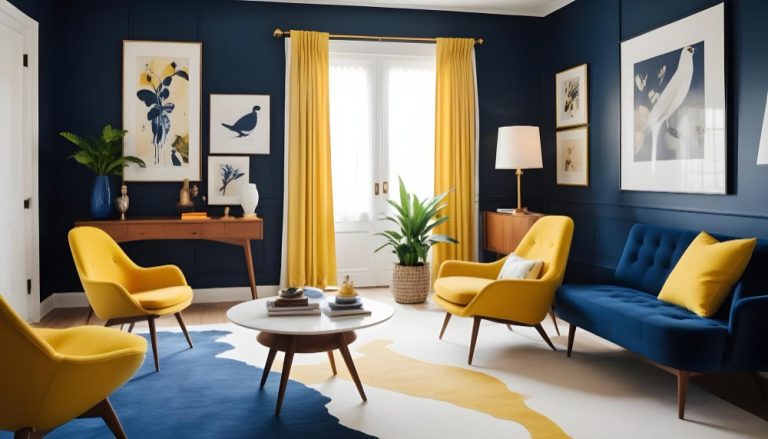Colour is one of the most powerful tools in the realm of home decor. It shapes mood, alters perception, defines ambiance, and ultimately breathes life into a space. Yet, despite its transformative potential, colour is often approached with hesitation—either used too sparingly or applied in a way that disrupts rather than enhances. Mastering colour in home decor is not about following rigid rules but understanding how to use it with confidence and nuance. Below are ten refined and practical colour tips to help elevate your interior spaces with style, balance, and grace.
1. Understand the Psychology of Colour
Colour is far more than a visual element; it influences how a space feels. Cool hues like blues and greens are calming and ideal for bedrooms or bathrooms, while warm tones such as terracotta, mustard, and coral create coziness and energy, perfect for living rooms or dining areas. Before choosing a palette, consider how you want a room to feel. Let emotion guide your colour choices, and you’ll create environments that resonate on a deeper level.
2. Start with a Neutral Base
A neutral foundation allows colour to speak with clarity and elegance. Shades like ivory, greige, soft taupe, and muted grey provide a timeless canvas that adapts effortlessly to seasonal accents or changing tastes. Neutral walls or large furniture pieces offer flexibility and help prevent visual fatigue, especially in rooms you use daily. With this subdued backdrop, you can explore bolder hues in accents without overwhelming the space.
3. Use the 60-30-10 Rule for Balance
This classic interior design guideline ensures colour harmony throughout a room. Sixty percent should be your dominant colour—usually walls or large furniture. Thirty percent can be a complementary secondary shade, found in curtains, rugs, or smaller furniture. The final ten percent is your accent colour, which might appear in cushions, artwork, or decorative objects. This balance creates visual stability while allowing dynamic contrast.
4. Play with Undertones
Two beiges or greys might look similar until placed side by side—one leans cool, the other warm. Recognizing undertones is essential when mixing hues. For instance, pairing a warm white with a cool blue may feel jarring, while a crisp white with blue undertones will blend seamlessly. Test colours in your actual lighting conditions, as both natural and artificial light dramatically influence how undertones appear.
5. Don’t Fear the Dark Shades
Dark colours, when used strategically, can be incredibly sophisticated. Deep navy, charcoal, forest green, or even black can add depth, drama, and a cocooning effect—especially in small spaces. Used on an accent wall, cabinetry, or even the ceiling, dark tones provide a rich counterbalance to lighter elements and can make a room feel more grounded and intimate.
6. Incorporate Colour Through Texture
Colour isn’t confined to paint swatches—it lives in textiles, woods, metals, ceramics, and natural materials. A blush velvet sofa, rust-hued linen curtains, or sage-green glazed tiles introduce colour in ways that are textural and tactile. This layering adds dimension to your palette and brings visual interest without requiring a dramatic commitment to bold walls or flooring.
7. Let Nature Inspire Your Palette
Some of the most harmonious colour schemes come directly from nature. Think of the soft gradient of a sunset, the calm blues and beiges of the beach, or the deep greens and browns of a forest. These organic combinations feel innately balanced and timeless. Drawing from natural references not only creates beautiful interiors but also connects the home to the outside world, enhancing a sense of serenity.
8. Use Accent Colours with Purpose
Accent colours are not just for flair—they’re tools for storytelling and spatial cohesion. Choose one or two accent colours to repeat throughout the home in small doses: in artwork, throws, cushions, or vases. This repetition creates rhythm and continuity. Be intentional rather than impulsive; an accent colour should echo the tone and personality of the space, not clash with it.
9. Test Before You Commit
Paint chips can be deceptive. Before finalising a paint colour, test large swatches on different walls at various times of day. Observe how morning light, afternoon sun, and evening bulbs affect the shade. Even a subtle shift in lighting can make a beige look pink or a grey seem blue. Taking the time to test ensures your chosen colour behaves beautifully in your specific environment.
10. Be Authentic to Your Style
Trends can be tempting, but the best colour choices are those that feel personal. Your home should be a reflection of your taste and lifestyle, not a copy of a showroom. Love bold citrus tones? Find refined ways to include them, perhaps in art or upholstery. Prefer muted palettes? Embrace their sophistication. When your colour choices align with your identity, the decor feels cohesive and genuine.
Ultimately, colour in home decor is not just about aesthetics—it’s about creating environments that support how you live, feel, and connect to your space. Whether you prefer a monochrome sanctuary or a vibrant, eclectic mix, applying colour with thoughtfulness and restraint will ensure your home is not just stylish, but deeply satisfying to inhabit. Let colour be your ally, not your fear. With a nuanced approach, even the simplest palette can speak volumes.

